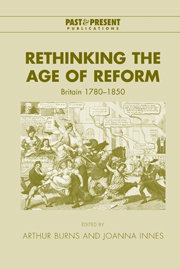Book contents
- Frontmatter
- Contents
- Notes on contributors
- Preface
- List of abbreviations
- 1 Introduction
- 2 ‘Reform’ in English public life: the fortunes of a word
- 3 Parliament, the state, and ‘Old Corruption’: conceptualizing reform, c. 1790–1832
- 4 ‘Old wine in new bottles’: the concept and practice of law reform, c. 1780–1830
- 5 English ‘church reform’ revisited, 1780–1840
- 6 Medicine in the age of reform
- 7 British antislavery reassessed
- 8 ‘The age of physiological reformers’: rethinking gender and domesticity in the age of reform
- 9 Reforming the aristocracy: opera and elite culture, 1780–1860
- 10 Reform on the London stage
- 11 Reforming culture: national art institutions in the age of reform
- 12 Irish reform between the 1798 Rebellion and the Great Famine
- 13 Empire and parliamentary reform: the 1832 Reform Act revisited
- 14 Reforms, movements for reform, and possibilities of reform: comparing Britain and continental Europe
- Index
- Past and Present Publications
7 - British antislavery reassessed
Published online by Cambridge University Press: 15 December 2009
- Frontmatter
- Contents
- Notes on contributors
- Preface
- List of abbreviations
- 1 Introduction
- 2 ‘Reform’ in English public life: the fortunes of a word
- 3 Parliament, the state, and ‘Old Corruption’: conceptualizing reform, c. 1790–1832
- 4 ‘Old wine in new bottles’: the concept and practice of law reform, c. 1780–1830
- 5 English ‘church reform’ revisited, 1780–1840
- 6 Medicine in the age of reform
- 7 British antislavery reassessed
- 8 ‘The age of physiological reformers’: rethinking gender and domesticity in the age of reform
- 9 Reforming the aristocracy: opera and elite culture, 1780–1860
- 10 Reform on the London stage
- 11 Reforming culture: national art institutions in the age of reform
- 12 Irish reform between the 1798 Rebellion and the Great Famine
- 13 Empire and parliamentary reform: the 1832 Reform Act revisited
- 14 Reforms, movements for reform, and possibilities of reform: comparing Britain and continental Europe
- Index
- Past and Present Publications
Summary
The most obvious and distinctive feature of the antislavery movement when compared with other examples of social activism in the age of reform is that the very nature of antislavery objectives gave the movement a dual character, domestic and imperial. Antislavery required within Britain the development of a sophisticated form of the politics of alliances that had to be reconstituted as new social forces emerged. Only by such means could sufficient leverage be developed to change state policy on the slave-trade and the reliance on slave labour in colonial economies. Abolitionists soon concluded, however, that changes in policy could only be effective if the conditions of the populations raided by the slave-traders and of the slaves in the colonies were remade in order that they would be able to live in civilized freedom. Thus antislavery also required imperial action to alter the character of societies in West Africa and in the West Indies. From the beginning of organized antislavery in the late 1780s this imperial aspect was envisaged as possessing linked institutional, moral, and commercial components.
Many abolitionists were also involved in other efforts at changing public institutions or practices. The Anglican evangelical Clapham Sect, evangelical dissenters, Quakers, rational dissenters, and Unitarians separately – and sometimes together – pursued a whole range of changes in personal behaviour, institutions, and social practices. Modern historians have, therefore, not surprisingly, regarded abolitionists as reformers. But the language of successive generations of contemporaries indicates a more complicated history as to how antislavery was perceived.
- Type
- Chapter
- Information
- Rethinking the Age of ReformBritain 1780–1850, pp. 182 - 199Publisher: Cambridge University PressPrint publication year: 2003
- 1
- Cited by

